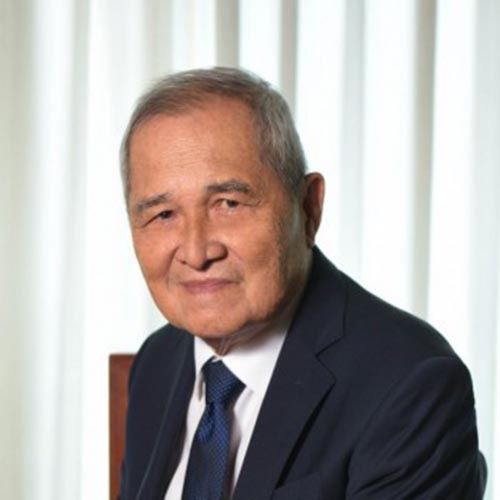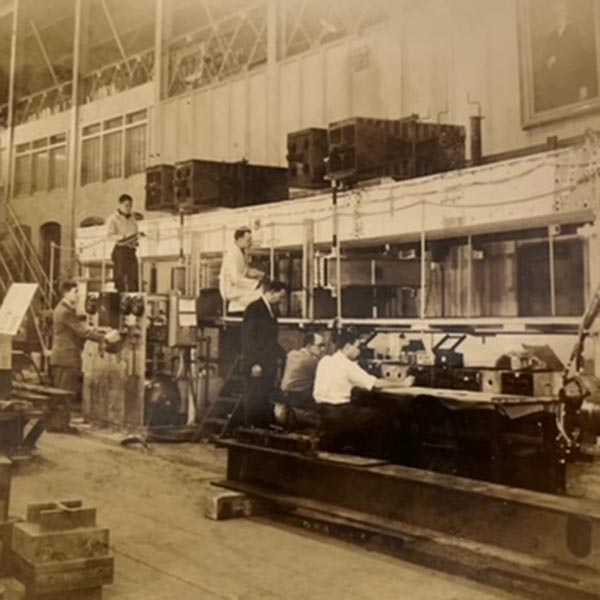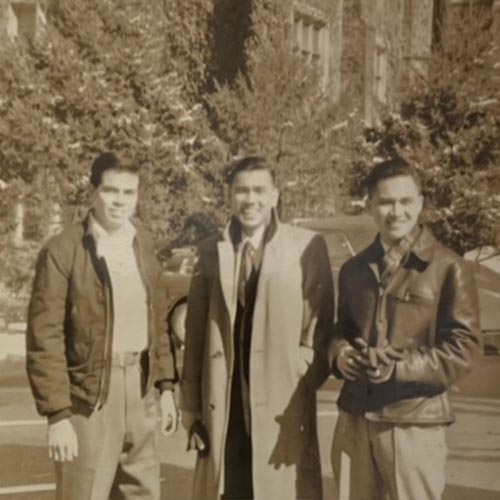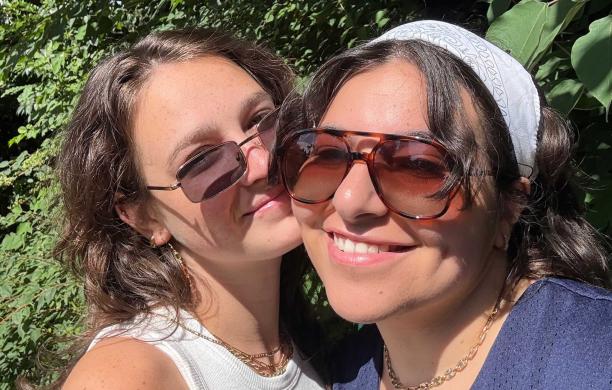Cesar Buenaventura ’54 has recently published a three-volume memoir to capture the three phases of his life. I Have a Story to Tell was intended for family and friends, but he has been besieged by others for copies. It’s not surprising for one of his country’s first Fulbright scholars, a Lehigh graduate, a storied executive, and an Honorary Officer of the British Empire. Here’s a snippet of his amazing life.
Coming to Lehigh
Buenaventura confesses that he didn’t know where Lehigh was located when offered a research assistant position in 1952 as part of the U.S. Fulbright program. He was a member of the third wave of students selected from the Philippines to study in the United States. An advanced engineering degree from the U.S. was a dream of his.
 At 22 years old, having never left his country, Buenaventura boarded a ship and crossed the ocean — a 21-day journey to San Francisco. He then traveled by train to the Lehigh Valley. Disembarking in Bethlehem, he didn’t know a soul. He walked to the admissions office where staff provided him with a list of local boarding houses. For the first few weeks, he rented a room for $7 per week until he got on his feet in this new city.
At 22 years old, having never left his country, Buenaventura boarded a ship and crossed the ocean — a 21-day journey to San Francisco. He then traveled by train to the Lehigh Valley. Disembarking in Bethlehem, he didn’t know a soul. He walked to the admissions office where staff provided him with a list of local boarding houses. For the first few weeks, he rented a room for $7 per week until he got on his feet in this new city.
Time at Lehigh
Buenaventura soon met the other graduate students in Fritz Lab. Twenty of them were from other countries, including Japan, Germany, France, Norway, Switzerland, and Holland, which accounted for 10 of the graduate students. Passions were still high between some; it had only been a few years since the end of World War II. But the students soon made peace.
Each earned a $120 stipend a month — after taxes, it was $106. Buenaventura and the Dutchmen rented an attic apartment on Carlton Avenue. They were frugal, buying margarine instead of butter and living off chicken wings (11 cents a pound) and milk (25 cents a quart). They didn’t have a television, but their landlady would sometimes let them watch with her on her 17-inch black-and-white TV. He recalls seeing future President Richard Nixon’s “Checkers” speech about his family dog, which helped him retain his position as running mate for presidential candidate Gen. Dwight Eisenhower.
 Fritz Lab pioneered pre-stressed concrete research, and his group tested beam strength, simulating 20 years of 20-ton vehicle traffic over the course of four to five months. Buenaventura was on the midnight shift, working 22 hours a month.
Fritz Lab pioneered pre-stressed concrete research, and his group tested beam strength, simulating 20 years of 20-ton vehicle traffic over the course of four to five months. Buenaventura was on the midnight shift, working 22 hours a month.
In the summer, he had an internship working on the New Jersey Garden State Parkway with pre-stressed concrete overpasses — it paid handsomely at $350 per month.
He graduated from the program in three semesters, finishing his master’s in February 1954. He used his final semester to teach a land surveying course at Lafayette College, substituting for a professor who was out due to an illness.
After Lehigh
Buenaventura started a job as a supervising engineer in Gloucester City, New Jersey, working on the Walt Whitman Bridge. He was one of the few college graduates on the project and gained valuable insights working alongside blue collar union laborers. He learned to be independent, became more mature, and navigated racial discrimination. He held this position for over a year before he made the difficult choice to return home.
When he told his supervisors, they offered him an opportunity to obtain a green card and remain in the U.S. While Buenaventura appreciated the gesture, it didn’t change his mind. Those same supervisors let him know they’d welcome his return if he ever decided to come back. “For the three years and four months that I was in the United States, I grew up and felt on top of the world,” he says.
 He was grateful for his experience and the improved status in his life. Buenaventura took the long way back home, traveling through Europe and visiting Lehigh friends who returned to their European homelands after graduation. While on that trip, he bought a Volkswagen Beetle and drove around the continent from France to the Italian Riviera. After the jaunt, he loaded the car on the ship that took him back home to Manila.
He was grateful for his experience and the improved status in his life. Buenaventura took the long way back home, traveling through Europe and visiting Lehigh friends who returned to their European homelands after graduation. While on that trip, he bought a Volkswagen Beetle and drove around the continent from France to the Italian Riviera. After the jaunt, he loaded the car on the ship that took him back home to Manila.
Back Home
Buenaventura arrived in the Philippines in October. His friends induced him to apply with Shell Oil, and he was soon hired as an executive trainee. He thought that he’d try it for a year … and remained for 68 years, rising to be the first Filipino CEO and chairman of the company for 15 years and remaining as a director after his retirement for another 35 years. Over that long career, he navigated an oil crisis, lived under martial law, laid the groundwork for the introduction of natural gas power plants, and established a foundation whose flagship program led to the eradication of malaria in the country. He also served on the monetary board of the Philippine central bank from 1981-87.
At 94 years old, he still has gas in his tank, sitting on the boards of eight publicly listed companies, some of the largest in his country.
“I feel blessed to be this lucid, still active in the community, still able to play golf, and surrounded by a loving family,” he says. He was married for 32 years and had five children before his spouse succumbed to cancer. Three years later, he remarried and recently celebrated 31 years together.
There are quite a few of his countrymen who followed him to Lehigh, including his wife’s brother. Among Lehigh’s alumni in the Philippines are Reinero Reyes ’58, former secretary of transportation and communications; Fiorello Estuar ’67, former secretary of public works and highways; and Narciso Abaya ’74, former chief of staff of the Armed Forces.


